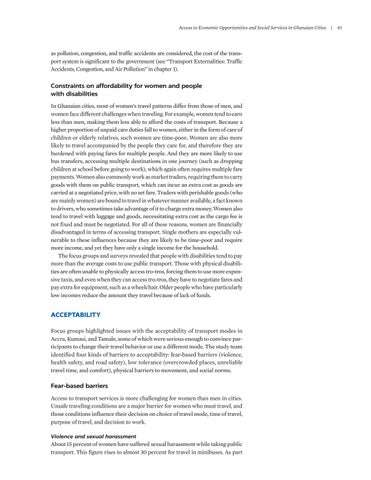Access to Economic Opportunities and Social Services in Ghanaian Cities | 41
as pollution, congestion, and traffic accidents are considered, the cost of the transport system is significant to the government (see “Transport Externalities: Traffic Accidents, Congestion, and Air Pollution” in chapter 1).
Constraints on affordability for women and people with disabilities In Ghanaian cities, most of women’s travel patterns differ from those of men, and women face different challenges when traveling. For example, women tend to earn less than men, making them less able to afford the costs of transport. Because a higher proportion of unpaid care duties fall to women, either in the form of care of children or elderly relatives, such women are time-poor. Women are also more likely to travel accompanied by the people they care for, and therefore they are burdened with paying fares for multiple people. And they are more likely to use bus transfers, accessing multiple destinations in one journey (such as dropping children at school before going to work), which again often requires multiple fare payments. Women also commonly work as market traders, requiring them to carry goods with them on public transport, which can incur an extra cost as goods are carried at a negotiated price, with no set fare. Traders with perishable goods (who are mainly women) are bound to travel in whatever manner available, a fact known to drivers, who sometimes take advantage of it to charge extra money. Women also tend to travel with luggage and goods, necessitating extra cost as the cargo fee is not fixed and must be negotiated. For all of these reasons, women are financially disadvantaged in terms of accessing transport. Single mothers are especially vulnerable to these influences because they are likely to be time-poor and require more income, and yet they have only a single income for the household. The focus groups and surveys revealed that people with disabilities tend to pay more than the average costs to use public transport. Those with physical disabilities are often unable to physically access tro-tros, forcing them to use more expensive taxis, and even when they can access tro-tros, they have to negotiate fares and pay extra for equipment, such as a wheelchair. Older people who have particularly low incomes reduce the amount they travel because of lack of funds.
ACCEPTABILITY Focus groups highlighted issues with the acceptability of transport modes in Accra, Kumasi, and Tamale, some of which were serious enough to convince participants to change their travel behavior or use a different mode. The study team identified four kinds of barriers to acceptability: fear-based barriers (violence, health safety, and road safety), low tolerance (overcrowded places, unreliable travel time, and comfort), physical barriers to movement, and social norms.
Fear-based barriers Access to transport services is more challenging for women than men in cities. Unsafe traveling conditions are a major barrier for women who must travel, and those conditions influence their decision on choice of travel mode, time of travel, purpose of travel, and decision to work. Violence and sexual harassment
About 15 percent of women have suffered sexual harassment while taking public transport. This figure rises to almost 30 percent for travel in minibuses. As part



